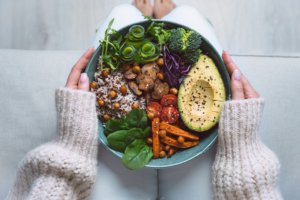What Is a Vegetarian Diet?
What Is a Vegetarian Diet?
Explained by a Long Island Registered Dietitian Nutritionist
Vegetarian diets are becoming increasingly popular for their health, ethical, and environmental benefits.
I often work with individuals who want to design a balanced vegetarian or vegan eating plan. With the right knowledge and a bit of planning, a vegetarian diet can be both healthful and sustainable.
A vegetarian diet excludes meat, poultry, and seafood. It focuses on foods that come primarily from plants, including:
- Vegetables
- Fruits
- Whole grains
- Legumes
- Seeds
- Nuts
There are several variations of vegetarian eating patterns:
- Vegan: Includes only plant-based foods. No animal proteins or by-products.
- Lacto-vegetarian: Includes plant foods and dairy products.
- Lacto-ovo vegetarian: Includes plant foods, dairy products, and eggs.
- Pescatarian: Includes plant foods and seafood.
- Flexitarian: Primarily plant-based, with occasional inclusion of chicken or fish, dairy products, and eggs, but excludes red meat.
Long Island Dietitian’s Tips and Recommendations for Vegetarian and Vegan Diet Plans
A healthy vegetarian diet includes a wide variety of whole foods and adequate macronutrients—some of which are less available in plant-based sources. These include fruits, vegetables, whole grains, legumes, nuts, and seeds.
Dietary Recommendations
- Eat a variety of foods: Focus on whole, unprocessed foods such as fruits, vegetables, whole grains, beans, nuts, and seeds.
- Include a protein source at every meal: Incorporate protein-rich foods like legumes, tofu, or nuts to ensure you get a range of amino acids.
- Limit less healthy choices: Minimize intake of foods high in added sugar, salt, and unhealthy fats.
- Consider supplements: For more restrictive diets, supplements for nutrients like Vitamin B12, iron, calcium, and omega-3s may be necessary.
- Stay hydrated: Drink plenty of water throughout the day.
Is It Possible for Vegetarians to Have a Balanced Diet That Includes All Macronutrients?
Yes—absolutely. With education, a personalized plan, and the right support, a well-planned vegetarian diet can be nutritionally complete. It can meet the needs of people at all stages of life—including athletes, pregnant women, and children—while also providing disease prevention benefits.
Can You Get All the Micronutrients Your Body Needs Without Meat?
The key to success is education and planning. A vegetarian diet must include a wide variety of foods to cover all essential nutrients. Since certain nutrients are less abundant in plant-based foods, consulting with a dietitian can help ensure a healthy transition to a vegetarian diet or strengthen your existing plan.
What Are the Health Benefits of a Vegetarian Diet Plan?
Vegetarian diets can offer numerous health benefits, including:
- Lower risk of heart disease
- Lower blood pressure
- Reduced risk of type 2 diabetes
- Healthier weight management
- Increased anti-inflammatory properties
Do I Recommend a Vegan Plan?
All types of vegetarian plans—including vegan diets—can be healthy and nutritionally adequate when properly designed.
Because vegan diets exclude all animal products, they require greater attention to specific nutrients. Protein, Vitamin B12, iron, calcium, iodine, and omega-3 fats are often low or lacking. All vegans need to take supplements to ensure adequate intake of these nutrients.
What Are the Challenges of a Vegetarian Diet?
The main concern with vegetarian diets is the potential for macro- and micronutrient deficiencies. Without proper planning, vegetarians may not get enough:
- Complete protein for muscle maintenance
- Vitamin B12, essential for nerve function and found almost exclusively in animal products
- Iron, especially heme iron (from meat), which is more easily absorbed
- Omega-3 fatty acids (EPA and DHA)
- Zinc, important for immune health and wound healing
Additionally, some vegetarians rely too heavily on processed foods like refined grains or sugary snacks, which can lead to poor nutrition overall. It’s common to assume “vegetarian snacks” are automatically healthy, but many are ultra-processed and lacking in nutrients.
A well-designed vegetarian or vegan diet can provide powerful health benefits—but it requires thought, planning, and an evidence-based approach. Whether you’re already vegetarian or considering the transition, the best diet is one that is balanced, nutrient-dense, and sustainable for your lifestyle.
If you’re unsure about your nutrient intake or want help building a personalized meal plan, I offer online nutrition therapy to clients across Long Island and New York. Take the guesswork out of implementing and maintaining a vegetarian diet!
Further Reading:


